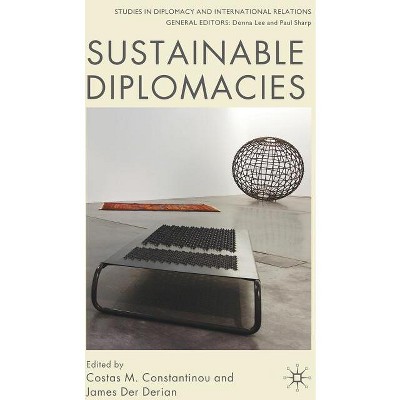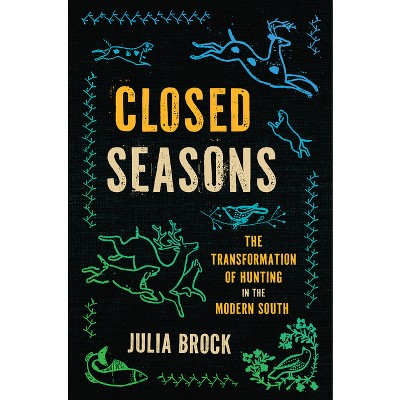$99.00 when purchased online
Target Online store #3991
About this item
Highlights
- Catastrophic Diplomacy offers a sweeping history of US foreign disaster assistance, highlighting its centrality to twentieth-century US foreign relations.
- About the Author: Julia F. Irwin is associate professor of history at the University of South Florida.
- 384 Pages
- History, World
Description
About the Book
"Catastrophic Diplomacy offers a sweeping history of US foreign disaster assistance, highlighting its centrality to twentieth-century US foreign relations. Spanning over seventy years, from the dawn of the twentieth century to the mid-1970s, it examines how the US government, US military, and their partners in the American voluntary sector responded to major catastrophes around the world. Focusing on US responses to sudden disasters caused by earthquakes, tropical storms, and floods-crises commonly known as 'natural disasters'-historian Julia F. Irwin highlights the complex and messy politics of emergency humanitarian relief. Deftly weaving together diplomatic, environmental, military, and humanitarian histories, Irwin tracks the rise of US disaster aid as a tool of foreign policy, showing how and why the US foreign policy establishment first began contributing aid to survivors of international catastrophes. While the book focuses mainly on bilateral assistance efforts, it also assesses the broader international context in which the US government and its auxiliaries operated, situating their humanitarian responses against the aid efforts of other nations, empires, and international organizations. At its most fundamental level, Catastrophic Diplomacy demonstrates the importance of international disaster assistance-and humanitarian aid more broadly-to US foreign affairs"--Book Synopsis
Catastrophic Diplomacy offers a sweeping history of US foreign disaster assistance, highlighting its centrality to twentieth-century US foreign relations. Spanning over seventy years, from the dawn of the twentieth century to the mid-1970s, it examines how the US government, US military, and their partners in the American voluntary sector responded to major catastrophes around the world. Focusing on US responses to sudden disasters caused by earthquakes, tropical storms, and floods--crises commonly known as "natural disasters"--historian Julia F. Irwin highlights the complex and messy politics of emergency humanitarian relief.Deftly weaving together diplomatic, environmental, military, and humanitarian histories, Irwin tracks the rise of US disaster aid as a tool of foreign policy, showing how and why the US foreign policy establishment first began contributing aid to survivors of international catastrophes. While the book focuses mainly on bilateral assistance efforts, it also assesses the broader international context in which the US government and its auxiliaries operated, situating their humanitarian responses against the aid efforts of other nations, empires, and international organizations. At its most fundamental level, Catastrophic Diplomacy demonstrates the importance of international disaster assistance--and humanitarian aid more broadly--to US foreign affairs.
Review Quotes
"Catastrophic Diplomacy is a rich, ground-breaking, and thoroughly researched study. Julia F. Irwin brilliantly demonstrates that foreign disaster assistance never functioned as a disinterested form of aid. . . . Irwin [is] an indispensable and authoritative voice of twentieth-century U.S. diplomatic history."--Journal of American History
"Catastrophic Diplomacy is a much-needed intervention in the expanding historiography of humanitarianism and foreign aid. It is invaluable for demonstrating the politics and practices of aid delivery, addressing both the United States' weaponization of relief in emergency contexts, as well as for uncovering the fascinating internal disputes between field-based internal disputes between field-based U.S. personnel as they debated what was the 'right' way to intervene in global crises. . . . I highly recommend adding this book to the canon of must-read humanitarian histories."--Margot Tudor, Passport
"An important, deeply researched, finely crafted, and readable book [that] breaks new ground in detailing the long history of the understudied subject of US disaster aid overseas. It challenges conventional wisdom about when the United States became involved in foreign aid. It offers a window into foreign policy decision-making in the early twentieth century. . . . And it shows that the United States often acted on a humane impulse to relieve suffering in other nations, albeit sometimes doing so in a self-interested, controlling, and/or condescending manner."--H-Diplo Roundtable
"Brilliant. . . . [A]n exciting argument and an important corrective to the historiography of foreign aid."--Diplomatic History
"Insgesamt ist ein großes Verdienst von Julia Irwin, die Verbindung von Hilfsbereitschaft und geleisteter staatlicher Hilfe als Teil der nationalen Interessenpolitik über das 20. Jahrhundert im Wandel umfassend informiert und klar argumentierend an markanten Beispielen nachgegangen zu sein."--sehepunkte
Translation: "Overall, Julia Irwin's great achievement is that she has investigated the connection between willingness to help and state aid as part of national interest policy over the changing 20th century in a comprehensive and clearly argued manner using striking examples."--sehepunkte
"A comprehensive and critical examination of an important yet under-explored aspect of US international relations. Irwin's work, rich in detail and scope, represents an invaluable resource not only for historians of US American foreign policy but also for current practitioners and policymakers in the field of international aid and diplomacy . . . . [a] sweeping study . . . . a significant scholarly achievement."--Not Even Past
"For the current and future practice of disaster aid in the climate century, Catastrophic Diplomacy illustrates that nothing was inevitable in the history of US foreign disaster relief."H-Environment
"This thought-provoking book . . . . reveals how factors such as geopolitical self-interest, national sovereignty, socioeconomic disparities, and pure happenstance influenced when and how the US chose to respond to humanitarian crises . . . .understanding how the US historically used foreign assistance to further its self-interest abroad provides important lessons that can inform American policymakers' responses to international catastrophes today."--CHOICE
About the Author
Julia F. Irwin is associate professor of history at the University of South Florida.Dimensions (Overall): 9.21 Inches (H) x 6.14 Inches (W) x 1.0 Inches (D)
Weight: 1.67 Pounds
Suggested Age: 22 Years and Up
Sub-Genre: World
Genre: History
Number of Pages: 384
Publisher: University of North Carolina Press
Format: Hardcover
Author: Julia F Irwin
Language: English
Street Date: January 9, 2024
TCIN: 1003045641
UPC: 9781469676234
Item Number (DPCI): 247-50-2693
Origin: Made in the USA or Imported
If the item details above aren’t accurate or complete, we want to know about it.
Shipping details
Estimated ship dimensions: 1 inches length x 6.14 inches width x 9.21 inches height
Estimated ship weight: 1.67 pounds
We regret that this item cannot be shipped to PO Boxes.
This item cannot be shipped to the following locations: American Samoa (see also separate entry under AS), Guam (see also separate entry under GU), Northern Mariana Islands, Puerto Rico (see also separate entry under PR), United States Minor Outlying Islands, Virgin Islands, U.S., APO/FPO
Return details
This item can be returned to any Target store or Target.com.
This item must be returned within 90 days of the date it was purchased in store, shipped, delivered by a Shipt shopper, or made ready for pickup.
See the return policy for complete information.
Trending Non-Fiction

$12.54
was $15.38 New lower price
4.5 out of 5 stars with 13 ratings

$20.18
was $24.50 New lower price
5 out of 5 stars with 7 ratings
Discover more options

$8.99 - $13.99
MSRP $8.99 - $18.99
3.5 out of 5 stars with 2 ratings









